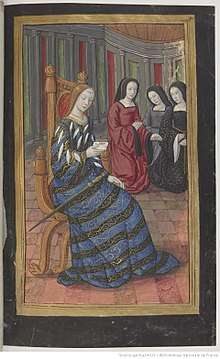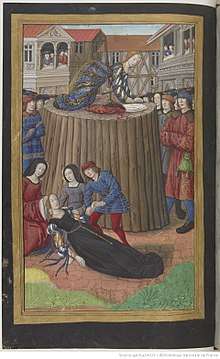Canace
In Greek mythology, Canace (/ˈkænəˌsiː/; Ancient Greek: Κανάκη means "‘barking") was a daughter of Aeolus and Enarete,[1] and lover of Poseidon.[2] Her brothers were Athamas, Cretheus, Deioneus, Magnes, Perieres, Salmoneus and Sisyphus. Her sisters were Alcyone, Arne, Calyce, Peisidice, Perimede and Tanagra.[3] With Poseidon, she was the mother of Aloeus, Epopeus, Hopleus, Nireus and Triopas.[4]


Mythology
In another, more famous version Canace was a lover not of Poseidon, but of her own brother Macareus. This tradition made them children of a different Aeolus, the lord of the winds (or the Tyrrhenian king),[5] and his wife Amphithea. Canace fell in love with Macareus and committed incest with him, which resulted in her getting pregnant. Macareus promised to marry Canace but never did. When their child was born, Canace's nurse tried to take the baby out of the palace in a basket, pretending to be carrying a sacrificial offering, but the baby cried out and revealed itself. Aeolus was outraged and compelled Canace to commit suicide as punishment, sending her a sword with which she was to stab herself. He also exposed the newborn child to its death. This story was told by Latin poet Ovid in the Heroides, a selection of eighteen story-poems that pretend to be letters from mythological women to their lovers and ex-lovers.[6] The story is also briefly referred to by Hyginus[7] and retold by Pseudo-Plutarch, in whose account Macareus kills himself over the matter as well.[8] It was also the subject of Euripides' lost play Aeolus, on which the extant versions appear to be based.
In the myth of Arachne, told in Ovid's Metamorphoses, Arachne depicts Poseidon seducing Canace as a bull in her tapestry of the male gods and their various love affairs.
Her story was also put to the stage in the verse tragedy Canace (1588), by Italian playwright Sperone Speroni, as well as being the subject of a tale in Gower's Confessio Amantis. She also gave her name to the heroine of Geoffrey Chaucer's Squire's Tale.
Notes
- Hesiod, Catalogue of Women fr. 10(a) Pap. Turner, fr. 1-3, col. I-II, 25-75
- Callimachus, Hymn to Demeter 99: Triopas mentions Canace as his mother by Poseidon
- Pseudo-Apollodorus. Bibliotheca, 1.7.3
- Pseudo-Apollodorus, Bibliotheca, 1.7.4
- These two are barely distinct in any case; see the article on Aeolus for discussion
- Ovid, Heroides, 11
- Hyginus, Fabulae, 238 (Aeolus kills Canace), 242 (Macareus kills himself after Canace's death), 243 (Canace kills herself over her forbidden love for Macareus)
- Pseudo-Plutarch, Greek and Roman parallel Stories, 28
References
- Callimachus, Hymns translated by Alexander William Mair (1875-1928). London: William Heinemann; New York: G.P. Putnam's Sons. 1921. Online version at the Topos Text Project.
- Callimachus, Works. A.W. Mair. London: William Heinemann; New York: G.P. Putnam's Sons. 1921. Greek text available at the Perseus Digital Library.
- Hesiod, Catalogue of Women from Homeric Hymns, Epic Cycle, Homerica translated by Evelyn-White, H G. Loeb Classical Library Volume 57. London: William Heinemann, 1914. Online version at theio.com
- Hyginus, Fabulae from The Myths of Hyginus translated and edited by Mary Grant. University of Kansas Publications in Humanistic Studies. Online version at the Topos Text Project.
- Plutarch, Moralia with an English Translation by Frank Cole Babbitt. Cambridge, MA. Harvard University Press. London. William Heinemann Ltd. 1936. Online version at the Perseus Digital Library. Greek text available from the same website.
- Pseudo-Apollodorus, The Library with an English Translation by Sir James George Frazer, F.B.A., F.R.S. in 2 Volumes, Cambridge, MA, Harvard University Press; London, William Heinemann Ltd. 1921. Online version at the Perseus Digital Library. Greek text available from the same website.
- Publius Ovidius Naso, The Epistles of Ovid. London. J. Nunn, Great-Queen-Street; R. Priestly, 143, High-Holborn; R. Lea, Greek-Street, Soho; and J. Rodwell, New-Bond-Street. 1813. Online version at the Perseus Digital Library.